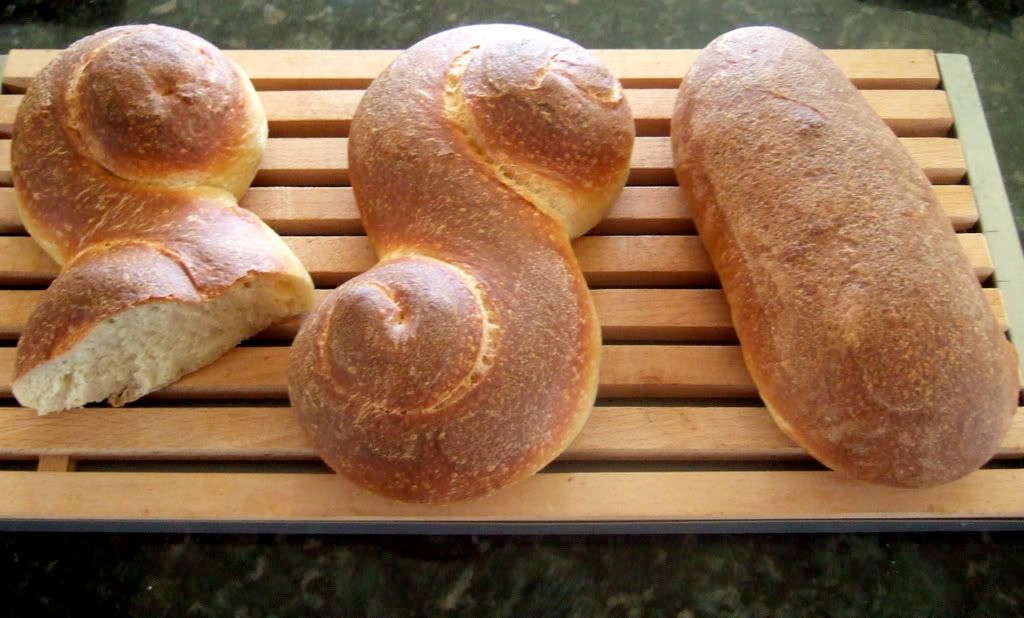I just got Peter Reinhart's The Bread Baker's Apprentice and intend to make many of his breads over the next few weeks. It's slightly unfortunate timing, since it'll be Passover in a month and then summer in a few more weeks (I'll wait, impatiently, until fall to put up a sourdough starter), but that just means I need to make as much bread as possible each weekend.
My first loaf was the pane siciliano, made with semolina flour. The nine-year-old promptly dubbed it "the best bread I've even tasted;" he'll be getting sandwiches made from the batard loaf this week. I'm going to try adding some whole grain flour to the recipe in the future.

I made a triple batch of his pate fermente on Thursday. One pound went into this bread; the other two are frozen for future use. The bread dough is made with the pre-ferment, high-gluten bread flour, semolina flour -- the nubby kind you make pasta out of -- a little honey and olive oil, salt, yeast and water. I kneaded, fermented, and shaped on Friday. It was an extremely flexible dough, stretching out like a baguette with no springing back at all. It went into the fridge overnight to proof. (I was out of sesame seeds, and the nine year old doesn't like them anyhow.)
I baked it this morning in a very steamy oven. (I preheated the oven to 550 degrees, with a cast iron skillet on the floor. I poured in simmering water and closed the door quickly, twice. The oven was incredibly steamy, despite no additional misting of water). When the bread went in, I turned the heat down to 450. After 15 minutes, I separated the breads, because they were touching; ten minutes later, they were done (205+ on the thermometer.)
Unanimous verdict? Yum.
For next time:
My first loaf was the pane siciliano, made with semolina flour. The nine-year-old promptly dubbed it "the best bread I've even tasted;" he'll be getting sandwiches made from the batard loaf this week. I'm going to try adding some whole grain flour to the recipe in the future.

I made a triple batch of his pate fermente on Thursday. One pound went into this bread; the other two are frozen for future use. The bread dough is made with the pre-ferment, high-gluten bread flour, semolina flour -- the nubby kind you make pasta out of -- a little honey and olive oil, salt, yeast and water. I kneaded, fermented, and shaped on Friday. It was an extremely flexible dough, stretching out like a baguette with no springing back at all. It went into the fridge overnight to proof. (I was out of sesame seeds, and the nine year old doesn't like them anyhow.)
I baked it this morning in a very steamy oven. (I preheated the oven to 550 degrees, with a cast iron skillet on the floor. I poured in simmering water and closed the door quickly, twice. The oven was incredibly steamy, despite no additional misting of water). When the bread went in, I turned the heat down to 450. After 15 minutes, I separated the breads, because they were touching; ten minutes later, they were done (205+ on the thermometer.)
Unanimous verdict? Yum.
For next time:
- Try replacing about a third of the flour in the pre-ferment with King Arthur white whole whole wheat.
- The batard loaf is a little small for sadwiches;maybe make one large batard and one spiral next time? It also should probably be slashed; it split some on the side.
- After 15 minutes in the oven, take the bread off the pan entirely and put them directly on the rack. The middle load stayed white and soft on the sides because they didn't get enough direct heat.
- jessicap's Blog
- Log in or register to post comments
Those look just beautiful.
- Log in or register to post comments